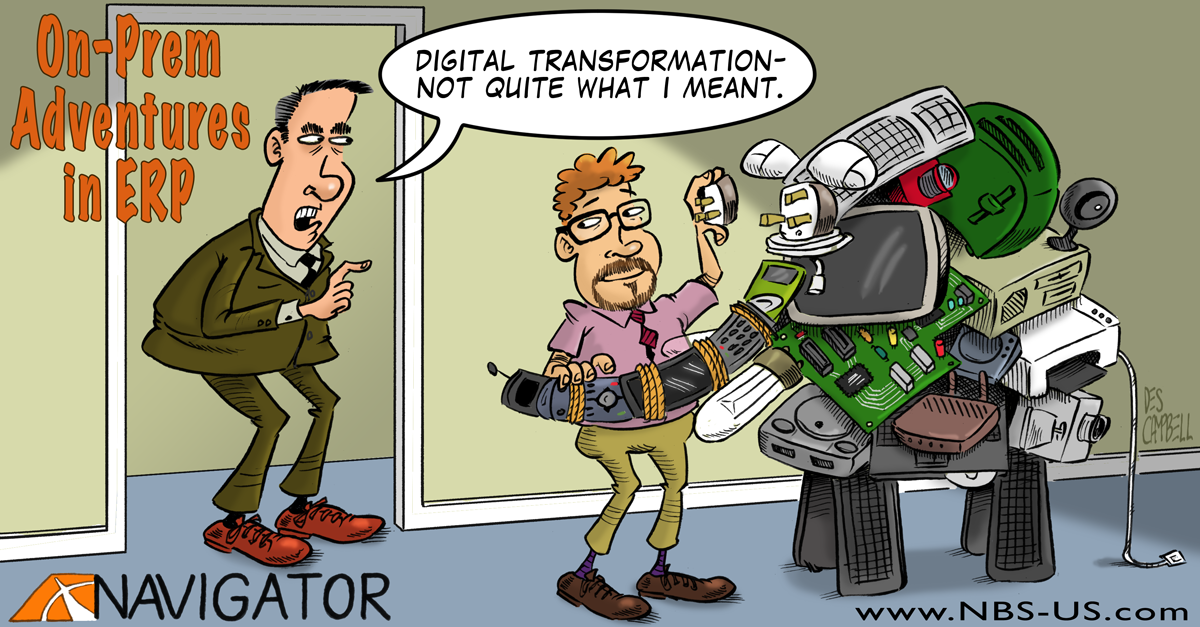
Signs It's Time to Take a Second Look at Your ERP System
You implemented your enterprise resource planning (ERP) system because you wanted your business to operate more efficiently, with stronger and more automated controls—and, of course, you wanted to reap cost savings from those benefits. Ultimately, you aspire to get better visibility into your operations so you can accelerate your revenue growth.
But are you getting what you need from your system?
ERP software implementations don’t always follow a straightforward path to success. Given all the training, time, and resources you have to dedicate to getting an ERP system up and running smoothly, there’s plenty of room for problems to arise without warning. This can lead to delays and unexpected extra costs that snowball quickly and have negative impacts on production and sales.
In many cases, the problems that come up after implementation have a common cause: you selected the wrong ERP system for your business needs. This is understandable; the market today is flooded with solutions and vendor partners. It’s easy get excited about an offering with a massive array of features and functionalities.
Explore ERP Optimization Services | Explore Save Our System (SOS) Services
Regardless of all the bells and whistles a product may offer, if the software can’t optimize your operations, it isn’t the best choice for your business. Similarly, if a solution provider isn’t guiding you on your journey with your specific quality standards in mind, you aren’t getting the best value possible from your partnership.
What’s the Problem?
If your ERP system is generating more challenges than solutions, something is wrong. You could find yourself spending time and effort pinpointing exactly what’s going on at a point in your business’s evolution when you were hoping to simplify your operations.
You may be dealing with a system that has functional issues that create problems with performance, usability, and visibility into your operations. Maybe your system is just outdated. Perhaps the major issue is a relationship mismatch with your vendor. It could even be a combination of all these issues.
Here are some of the most common reasons an ERP system or solution partner might not be the right fit:
- The system isn’t meeting your expectations. This could result from a few factors, including the misalignment of the project from the outset, miscommunication, and mismanagement of the software application. Usually, this ties back to your vendor relationship, and fixing it requires an evaluation of how well your partner understands your goals and implements solutions to meet them.
- Users keep looking for workarounds. If your ERP system isn’t automating and streamlining your business in a way that simplifies operations and leaves more time for revenue generation, frustration will mount and users will turn to other resources to get the job done. The right ERP solution will scale with your specific business needs, and it can be customized in ways that simplify processes seamlessly and continuously.
- Your solution partner isn’t responsive. When you invest in an ERP system, you deserve to feel valued as a customer and receive prompt attention when you have questions and issues. If requests for support go unaddressed or timelines drag out, you may start to realize that you’re just another number to your partner. You deserve better, and as a business, you know that attentive customer service is essential.
- Your vendor is constantly trying to upsell you. Nothing is more annoying than a partner that is pushy and always trying to get more money from you. If your vendor keeps pushing new features and customizations that you know you don’t need or aren’t ready to adopt, it’s a strong signal that you’re not in a mutually beneficial relationship.
It Might Be Time to Make a Switch
If any of these reasons resonate, it is a good indication you could stand to benefit from a re-evaluation of your system and your relationship with your vendor. You invested in a system with clearly outlined goals, and if they aren’t being met, you’re not getting the value you should.
You don’t necessarily need to throw out the baby with the bathwater right away, however. A more moderate approach can involve simply getting advice from other professionals or seeking a second opinion from an ERP expert.
Don’t forget to consult with your employees to document their pain points with the current system and learn ways their work processes could be improved.
Not all solutions are created equal. Even if your current system isn’t working for you, don’t fall into the trap of believing that a higher price tag delivers greater value. If you have an ERP implementation that isn’t working well for your needs, you at least should now have a better sense of what features will create value for your specific business. Trust your instincts and your hard-earned knowledge.
Finally, you now know that a system is often only as strong as the vendor relationship that helps support it. If you can’t find some middle ground to get what you need—and deserve—from your solution partner, it may be time to look inward.
Navigator Business Solutions recognizes that when organizations struggle with their systems, they are distracted from their own customer relationships. If you’re dealing with a poor implementation or suffering from long-term issues with your ERP platform, we can help you pinpoint issues and run the system so it supports your organization as it should.
Contact us today to get the help you deserve.

